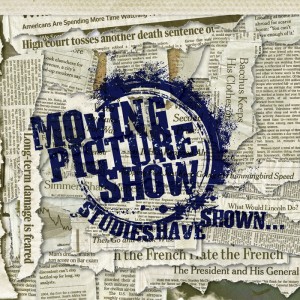First release is hot on the heels of growing acclaim
It’s the usual story. A band starts off with a dream in mind, rehearses for hours, lands a few gigs and hopes to catapult to stardom.
Moving Picture Show took the same trajectory as dozens of bands before them, playing show after show in locations spanning from USC’s very own Ground Zero Performance Café at a Haiti benefit concert to the White Eagle Café and Saloon in Portland, Ore.
Add to its list of accomplishments a coveted spot on KROQ’S Locals Only show hosted by Kat Corbett as well as a track on Rock Band, and the band now has solid ground to get its career running.
And all of this comes before the official release of its debut album.
For Matt Kap (vocals/guitar), Jeremy Nesse (bass) and Scott Manley (drums), the album, Studies Have Shown…, drops not only for the enjoyment of waiting fans but will also reveal whether this rapid preliminary success comes with true merit. It will ultimately show whether the trio can stay strong with the critical ears of radio waves and music fans. Are they ready for the blazing lights of bigger venues?
Certain tracks on the album leave the listener with some uncertainty about the band’s personality. The album includes a soothing, heartfelt track, “By Now,” that is blended seamlessly with a radio-friendly chorus and a melancholic yet sweet tune.
To add to this commercial persona, the CD also includes a cover of the ’80s Peter Gabriel track “Games Without Frontiers,” complete with a confidently heavier sound and the repetition of the title in flowing French.
But what separates the band from the cliché act of covering a well-known song and following a popular song structure is its confidence even when playing quieter tracks. Though the album sometimes seems to delineate a band struggling to find its identity, several tracks shine through, proving that Moving Picture Show means serious business.
“Silent Types” starts off anything but silently. It begins with a cacophony of noise that nonchalantly nosedives into the calmness of guitar strings and a soft melody. This is perfectly paired by a characteristic experimentation with words that create lyrics that craftily express worn sentiments and repeated subject matter.
The angst and frustration over common things such as lost love remains intact in the tracks but the lyrics still stand out. Kap honestly relates the complication of speaking through simple lyrics, So the summer time / does the talking for us both / don’t start drama / drama could make me / choke on commas / I wanna say things.
An unexpectedly deep voice melded with the soft timbre of an acoustic guitar introduces “It’s Time to Get What You Want,” a melody characteristic of a Grey’s Anatomy soundtrack. The band continues to stray away from the usual as Kap proclaims the very existence of commonality, Fighting some cliché / but you’re still here fighting with the back of your mind / and everywhere you look / are enemy lines. A tambourine sounds launches the song into its full musical range while Kap sings Don’t you stand there / pretending everything’s fine.
Although sometimes overly preachy, the track again shows an attempt to hone in on complex emotions and get through to someone that just does not listen.
The pearl in the album comes in the track with the least appealing title. “Uhuh Uhuh” serves as the best example of the band and is a well-thought tune. It starts off with an inviting beat and an intriguingly distorted voice that instead of taking away from the lyrics helps add a good degree of emotion.
The “uhuh” in the background is merely a deep, almost indiscernible timbre. The trio’s penchant for heavy-sounding blues chords and dance influence shines through. The bass and drums keep the feet of listeners moving and Kap’s abandon helps add emotion to the song even in spots where the lyrics become blurred and difficult to capture.
The product is not perfect, but the effort is sincere. The lack of a self-conscious sound, the confidence of obliterating the ever-friendly appeal of Auto-Tune and the group’s cohesivesness show that the band has potential.
Like any band, the key lies in grasping this potential and grabbing the attention it is garnering in the ever-changing and fickle world of music and running with it.
So can Moving Picture Show hope for mainstream success with the pressure of following up their initial success and the appeal of their official album release? Does the CD show the guys advancing in the music world?
As Kap adds at the end of “Uhuh Uhuh,” “Yeah, something like that.”

